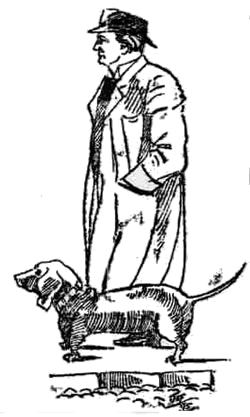 |
 |
||||||
GEORGE THORNE ON HIMSELF.
THE OLD FAVOURITE INTERVIEWED.
(BY OUR SPECIAL COMMISSIONER AND OUR SPECIAL ARTIST.)
We all love George Thorne, love his Jack Point, love his Bunthorne, love his Ko-ko, we love the little man himself. Out of his bright eyes peeps the spirit the real George Thorne, and that inner self in an incarnation of all the delightful stage-playing George Thornes rolled into one.
He comes of a play-acting family, his brothers and sister being the equally well-known: Fred, Tom, and Sarah Thorne. The Vaudeville Theatre, it will be recollected, was run by the former for over 20 years, until its comparatively recent acquisition the Gattis—while Miss Thorne is the popular lessee the Margate Theatre and trainer of the young in the acting art.
Perhaps Mr George Thorne’s best story—and has many—concerns his “first stage appearance.” It is so good that we give it in his own language.
“It took place at the age of two. The celebrated Frederick Robson was playing Medea(!), and he, or rather she. took me on to the stage as one of her two children. That was when I made my bow—or rather, my squeak—before an audience, and, as I shall be 40 in I can claim to have been 38 years on the stage.”
“Now, a truce to joking, friend Thorne” said we, and tell us of your real first stage appearance?”
“’Twas at the tender age of 15 years,” rejoined the inimitable one, “and in ‘little thing’ of my own concoction, somewhat in the pantomime way. That took place at my sister’s Margate Theatre.”
“What about your early stage training, following that first appearance?” we asked.
“ Oh, we’ll skip all that till we come to my fierce, wild adventures in a racing piece called “The Flying Scud”—that being the name of a racehorse—for you must know I have played well-nigh everything, from deepest infamy to lightest comedy. I acted this particular part 1,000 times, including several hundred nights at Sanger’s amphitheatre. Once, at the Portsmouth Theatre, the fiery steed I was wont to ride put his fore feet clean through the floor, and there he stuck, with me sitting his neck. ‘Then,’ as Rider Haggard says, ‘a strange thing happened.’ Everybody on the stage fled one man; two members of company, in panic, jumped into the orchestra, and the curtain was rung down with them still in front.”
“How excessively funny!”
“Yes, but funnier was store at the Northampton Theatre. There, after the performance one evening, the owner of the steed we had hired for the occasion sent round to say was wanted go hunting on the morrow. Now, this theatre was built on a hill, which made the auditorium a good deal lower than the stage, so that the beast had to be led up ascent, and to get him out we rigged an ‘inclined plane’ of planks at an angle of forty-five. But when, on this particular night, we tried to lead him down again, he would not budge an inch, sir—was frightened, I suppose. It ended in the poor beast being precipitated into the orchestra, where he chipped a bit off the bass-viol and seemed to hurt himself a good deal in the process. Strange to say, the news of his fall reached the owner, and that horse ‘played’ just as cheerily as usual next night.”
“Is it a fact that you travelled all the world over, Mr Thorne?”
“Practically all over the world save to Australia. I toured through America with Mrs Scott-Siddons’ Company, and also through India.”
“That last must have been very delightful”
“Yes—it was the prettiest possible sight look from the stage and see the whole houseful in evening dress. In Indian theatres there are no cheap seats, so that the scene is a most brilliant one.”
 |
“How came you to join Mr. D’Oyly Carte?” “I received an offer from him while in India, to play Bunthorne in ‘Patience,’ and I studied the part on the voyage home. That was in 1881. I may tell you that my assumptions in Gilbert-Sullivan opera have never been based on other people’s readings of a part. I have always stipulated that I shouldn’t see an opera before appearing in it.”
“You have played in all the original series of Gilbert-Sullivan operas now, I think ?”
“In all save ‘Princess Ida,’ and that we are going to play in few days’ time, with myself as the King. The part ought to suit me, as I have acted ‘Richard III,’ who decidedly resembles the character.”
“Have you any reference in the way of characterisation?” “Of course, I simply play what comes in my way, though in Gilbert and Sullivan I think my favourite is poor Jack Point. By the way, I can tell you an interesting anecdote of Henry Arthur Jones, dating from a period prior to the production of ‘The Silver King.’ He wrote to me, enclosing a little one-act play (I even forget the title), and asking me to use any influence I might possess to get it produced. I read it, saw that it wouldn’t do, and told him so. Several years afterwards, when Jones had climbed to fame, he produced the piece, when my judgment upon it was upheld, as it didn’t take.”
At this moment Thorne’s dachshund, “Waggles,” entered, and our artist hastened to include him in his drawing of the actor.
“Waggles has a history, too,” said Mr Thorne, “but I’ll content myself with telling you one story only in illustration of his rare intelligence. In a moment of weakness, I took him over to New Holland one day. When we got there, I said to him, ‘Waggles, this is New Holland.’” “And he replied—’I appreciate the joke!’”
Page modified 4 May 2021